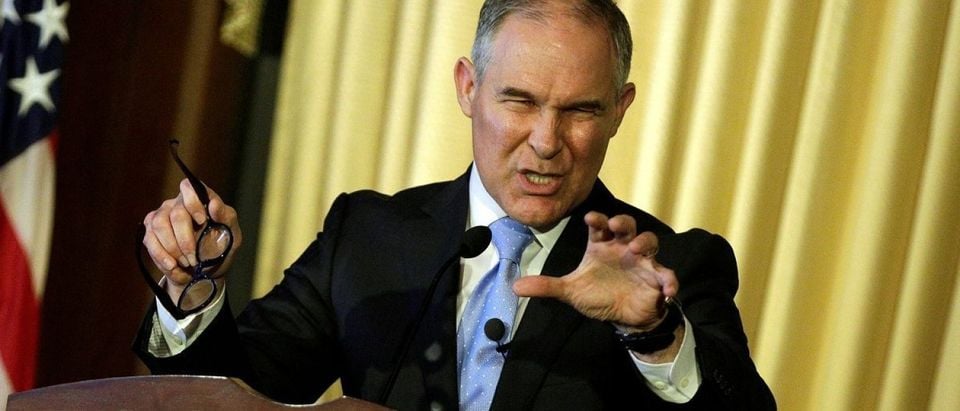James Madison, in the Federalist No. 46, highlighted that national and state government are affirmed, “but different agents and trustees of the people constituted with different powers.” In the Federalist No. 28, Alexander Hamilton indicated that these specific levels of governmental authority should be entrusted to provide citizens’ a benefit. “If they’re [the citizens’] rights are invaded by either; they can make use of the other as the instrument of redress.”
Speaking on the relationship of the state and national governments, citing the existence of the EPA’s self-endowed authority to supersede state jurisdiction for nearly the past decade, federal-state relationships look promising under Scott Pruitt as the agency actually is moving into a position to start serving the citizens, not special interests.
If you don’t know who Scott Pruitt is, he is the now former Oklahoma Attorney General who is serving as the Environmental Protection Agency’s 14th Administrator with an agenda that clearly shows only the tip of his and the administration’s plans for a better EPA.
In his first address to EPA staffers this past Tuesday, Pruitt highlighted an agency agenda that clearly indicates that the Trump appointee wants to reel in years of encumbering regulations on our nation’s economy. Specifically, he said, “I seek to ensure that we engender the trust of those at the state level,” and to focus on working together, rather (according to the Washington Examiner’s coverage) than being adversarial to each other.
Pruitt, taking a big step in a sea of environmental regulators and bureaucrats not used to such witchery, said that he saw no reason why the EPA couldn’t be pro-energy, pro-business, pro-jobs and pro-environment. And, even more blasphemous, he suggested that the agency shouldn’t have to choose one or the other to be effective.
This is where in the op-ed where I must ask you to just let Pruitt’s, and the administration’s, intentions sink into your mind-brains. Given where we find ourselves after nearly a decade of Obama environmental and energy regulation, the new presidency and the newly confirmed Administrator represent the next steps for meaningful reform and rollback in the federal government.
Considering the importance for a resurgence of federalism, especially in the spaces where the free market and the health of our environment intersect, Pruitt fronts a “back-to-basics” and a literal constitutional approach for the new era of the EPA.
I still am in the camp that views that we need to dump the agency entirely and go back to the drawing board, but Pruitt presents a potential policy and regulatory climate that has never been seen before.
For starters, the approach that the new administrator will take is one that dispels the extremist views and rhetoric of climate alarmism and brings in some realistic calculation to the alleged climate doomsday we apparently face. Nevermore, this is only a guiding principle. With this, we will see a push for free market-based environmentalism that asserts that the private sector has the self-levied social obligation to protect environmental interests while also allowing the markets alone. Businesses that have their firm’s environmental impact on the back burner shouldn’t feel bullied or harassed by the government, especially with Pruitt’s polar opposite views on the agency’s role (compared to his predecessors).
The most important reform, though, as highlighted by The Wall Street Journal’s Kimberly A. Strassel, is Pruitt’s experience in protecting his state from unconstitutional and illegal overreach will serve as, “exactly the reform the EPA needs.”
Pruitt will properly control and reel in the “climate” authority the executive agency, apparently, acquired through the years and soon learn its place, per the factual observation that Congress has never passed any “climate laws.” The only way the agency has been able to do such things is through executive order and case-law on litigation challenging regulations that never had any steam until Obama’s White House.
To conclude, though, the final points I have are very succinct: Pruitt wants to work with the states, put the EPA back on its original mission, and to promote economic growth without abandoning our environment’s health.
I couldn’t be happier with Pruitt’s performance, thus far, and I am confident that the inevitable reforms from the administration will be effective in shrinking government, streamlining regulation, and reducing it.


